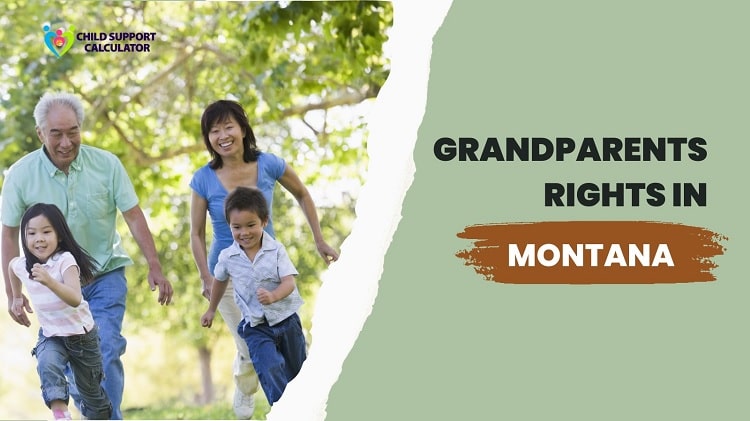Grandparents Rights In Wisconsin
Grandparents can play a special role in the lives of their grandkids. However, a parent’s death or divorce can affect how much time a grandmother is allowed to spend with their grandchildren.

Almost every state allows some type of grandparent visiting, but only if it is in the child’s best interests. Because the grandparent laws of each state aren’t always consistent, it’s critical to know the laws where you live. Grandparents rights in Wisconsin are discussed in this article.
Overview of Grandparent Visitation Laws
Grandparent rights in Wisconsin are enacted at the state level rather than at the federal level. This means that each state has its unique set of rules regarding grandparent visits. However, in Troxel v. Granville, the United States Supreme Court established a minimum requirement for grandparent visitation rights.
The Troxel decision maintained the validity of grandparent visiting legislation in Washington state, but it clarified the scope of such restrictions. Troxel emphasized that parents’ rights to raise their children are protected by the Constitution; however, grandparents do not have the same rights. Any custody or visitation decision should also take into account the wishes of a healthy, stable parent. While a parent’s desires are given “particular weight,” the case will be decided in the child’s best interests.
Grandparent Visitation Rights In Wisconsin
Parents have the fundamental right to raise their children in whatever way they see suitable, as long as their children’s basic emotional and physical requirements are addressed. However, Wisconsin law allows grandparents to have reasonable visitation with their grandchildren in certain circumstances, even if it is against the parents’ preferences.
A grandparent must submit a petition with the court requesting visitation. A court will hold a hearing to go over the details of the case and hear from the child’s parents. A judge must consider all of the following reasons before granting grandparent visitation:
- The child’s parents are not married, or were married but later divorced or split, or one of the parents has died.
- The kid isn’t going to be adopted.
- The grandparent has kept or attempted to establish a relationship with the child but was stopped by the parent.
- In terms of the child’s emotional, physical, educational, or spiritual well-being, the grandparent is unlikely to act in opposition to the parent’s decisions.
- Grandparent visitation is in the best interests of the child.
For grandparent visitation to take place in Wisconsin, all of the aforementioned criteria must be met. Grandparent visitation is nearly always granted in circumstances when the grandparents have a strong relationship with the child, and the child’s nuclear family unit has been broken by death or divorce.
In one Wisconsin case, for example, a grandmother was granted visiting rights because she saw her grandchildren at least once a week and once a month while the children’s mother (the grandparents’ daughter) was still living. The child’s father cut off visitation nearly entirely after she died. Despite the fact that the child’s father was a fit and proper parent, the judge concluded that grandmother visits were in the child’s best interests.
After the child’s father (the grandparents’ son) died, a Wisconsin court granted extended paternal grandparent visitation. The child’s mother only permitted the grandparents to see their kid on a supervised basis. The grandparents were successful in their lawsuit for unsupervised, regular visitation. Because of the intimate bond the grandparents had always maintained with their granddaughter. The court determined that continued visitation was in the child’s best interests.
Wisconsin courts are lenient in permitting grandparent visits if it will continue to serve the child’s best interests. In one example, a maternal grandmother was granted visitation with her grandchild every other weekend, on Mondays, Wednesdays, and Fridays, and on other occasions when the kid was not enrolled in a scheduled activity or attending school.
Despite the fact that the child’s father objected, the court determined that the lengthy visiting schedule did not violate his parental rights. If it is in the kid’s best interests, Wisconsin law enables a grandparent to enjoy reasonable visitation privileges. What constitutes “reasonable visitation” in your situation will be determined by the facts of your case.
Grandparent Custody Rights In Wisconsin
When it’s required to preserve the child’s safety or well-being, a grandparent may be able to win custody rights over the child’s natural parent. Only if the following conditions are met can a judge award custody to a child’s grandparent:
- The child’s best interests would be served by providing custody to the grandmother.
- There are also strong reasons for awarding custody to a grandparent if the parent is unsuitable or unable to care for the child appropriately.
In one Wisconsin instance, maternal grandparents sought and were denied custody of a granddaughter. After the child’s mother and father divorced, the grandparents moved in with their granddaughter. The child’s father and grandparents both sought custody of the child after the child’s mother died.
Despite the fact that the father had previously been uninvolved in his child’s life, he was granted custody. The court reasoned that if a natural parent isn’t unsuitable when he or she seeks custody, his or her rights should trump a grandparent’s.
Can a Biological Grandparent Obtain Visitation with a Grandchild That was Given up for Adoption
Adoption severs links between biological parents and grandparents. If a child’s parents voluntarily terminate their parental rights, the child’s grandparents lose their legal rights as well. A grandmother may appeal for visitation privileges in circumstances of stepparent adoption or when a kid is adopted by another relative. In the end, a judge will decide if visitation is necessary to support a child’s emotional requirements while also not jeopardizing the stepparent-child bond.
Grandparent visitation regulations are complicated and ever-changing. It’s critical to be aware of your rights under the laws of your state. Grandparent rights are normally secondary to a parent’s; however, if you can demonstrate that you formed a link with your grandchild and that visiting would be in the child’s best interests, you may be able to establish some sort of visitation. If you have any additional questions about grandparents rights in Wisconsin, you should get legal guidance from a local family law professional.
Can grandparents sue for visitation rights in Wisconsin?
Grandparents do not have visitation privileges in Wisconsin by default. In most circumstances, the right of a grandparent to see their grandchildren is left to the parent’s discretion. However, a grandparent or another third party, such as a stepparent, may petition the court for visitation in certain circumstances.
If you’re applying for visitation, you must be able to demonstrate that you have had a prior and significant relationship with the children. For example, suppose you used to visit your grandson every Sunday before the divorce but were abruptly barred from doing so after the parents divorced. In that case, a judge might rule that your visits were part of the child’s routine and should be allowed to continue.
Faqs
Unfortunately, Wisconsin law favors the preferences of the parents in raising their children, so you may have little recourse if they want to sever your relationship with your grandkids.
When it comes to visitation and custody rights in Wisconsin’s family court system, just one thing matters: the children’s best interests. If you decide to petition the court for visitation, you must show that not having a relationship with the children will be detrimental to them.
Third-party visitation occurs when a non-parent request court-ordered visitation with a kid. This isn’t a one-size-fits-all procedure; it varies depending on the status of the parents and whether or not a case is pending in family court. Because third-party visitation can be tricky, seeking legal assistance is a good idea.
Grandparents have the right to request visitation, although this isn’t always granted. If they have a strong relationship with the child that is being harmed by the parent, and they have proof that shows it is in the child’s best interests for the grandmother to have visitation rights, they can file a petition with the court and have it examined by a judge.
Unfortunately, Wisconsin law favors the preferences of the parents in raising their children, so you may have little recourse if they want to sever your relationship with your grandkids.
Furthermore, in a Supreme Court judgment from 2000, it was mainly decided that a parent should have the final word in their child’s upbringing. This decision establishes a precedent that could make future decisions in Wisconsin and other states more difficult.
A parent who has a proven history of substance abuse, mental instability, abandonment, child neglect, or criminal background, as well as other problems backed up by evidence, is considered unfit.
The police should be contacted first if you are afraid that your child is in danger. Once you’ve established that your children are safe, an attorney can aid you.







